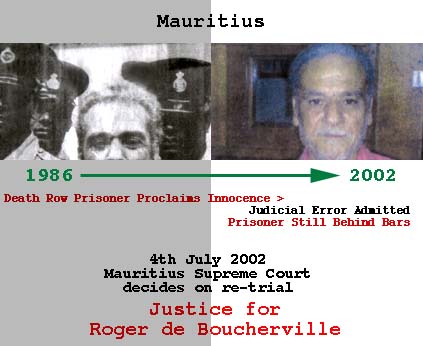Judicial Error in Mauritius
Sydney de Boucherville | 15.06.2002 19:02
2002: Judicial Error Admitted, Prisoner Still Behind Bars.
4th July 2002: Mauritius Supreme Court decides on re-trial.
(article 1)

Judicial Error in Mauritius
38b Grande Rue - 69340 Francheville - France
tel +33 472 16 92 62 - + 33 6 68 05 38 83
e-mail:
 s.de_boucherville@tiscali.fr
s.de_boucherville@tiscali.fr For the last sixteen years, my father, Roger France Pardaillan de Boucherville, has been in prison, sentenced to life for a crime he did not commit.
My father was sentenced in February 1986 for the murder of a taxi driver. He spent ten years on death row. The abolition of the death penalty in Mauritius transformed this death sentence into one of life imprisonment.
Since the case came to light, my father has ceaselessly proclaimed his innocence. He was vindicated in 1991 when fellow-defendant Serge Laval Lourdes belatedly confessed to committing the crime with another man, named "Marmite", who had been a witness at the trial.
Despite this fresh evidence, the judiciary in Mauritius have constantly prevaricated by a variety of means including procedural error, rejection of the right to appeal and spurious announcements of forthcoming release.
My father is 72 years of age. His health is extremely poor. He is now the longest-standing prisoner on the island. His case represent an extremely embarrassing instance of judicial error for our country, which nonetheless refuses to address it.
The case is unique in the annals of Mauritius. It goes back to a period when the island was a Crown dependency (it became a democratic republic in 1993: the head of state is now an indirectly-elected President).
Because the case belongs to the period of Crown dependency, it was referred to the Privy Council in 1997. A firm of solicitors, Sheridans of Red Lion Square, London, was appointed to act for my father and found grave anomalies. Despite which, all appeals have proved fruitless.
In 1997, following the co-defendant's confession and many years of lawyers requesting a re-trial, a judge ordered my father's release. But the High Court proved unable to find the files, and they were pronounced irretrievably lost.
The suspicion of conspiracy was further reinforced when in February 2000 my father was the victim of a poisoning attempt. Two prison warders and a fellow-inmate were transferred to another prison, but no charges of attempted homicide were preferred.
In early 2001, a letter from the Deputy Prime Minister came promising early release, but this promise was never fulfilled. We had to wait until early 2002 for a motion of appeal finally to be admitted: it will be heard in the High Court on 4th July next.
Once again we may not see justice done. Please consider attending the trial. My father feels that only press coverage and the presence of external witnesses can ensure fair treatment.
The island of Mauritius is not quite the immense sandy beach that most people think. Behind the walls of the prison of Beau Bassin, a man lies unremembered struggling against great injustice. Without the outside pressure exerted on the authorities by Amnesty International and a handful of newspaper articles, my father would not even have received the urgent surgery he has needed.
On health grounds alone, he should be released.
Our family demands acquittal. We demand acknowledgement of the immeasurable prejudice done to the victim.
PS I shall be in Mauritius from 23rd June 2002 to 6th July 2002 and can make available any documents in my possession.
My father is represented by Allan Daniel of Sheridans, 14 Red Lion Square, Holborn, London WC1N 4QL
+44 207 404 04 44
www.sheridans.co.uk
Chronology
1984: Murder of Sooreeadeo Jodhun, taxi driver. Fifty witnesses are heard. Principal investigator, Inspector Barret, dies before the trial.
1986: Roger de Boucherville condemned to death by the Court of Assizes, on the basis of a posthumous declaration by Inspector Barret. Co-defendant, Serge Laval Lourdes is condemned to 20 years imprisonment.
1991: Roger de Boucherville is proved innocent by new testimony. The co-defendant writes to Mr Panglose, one of Roger de Boucherville's lawyers, incriminating a witness named "Marmite" for perjury. Amnesty International refers to the case in its annual report and proclaims judicial error during the campaign against the death penalty and against various instances of police brutality on the island of Mauritius. The first request for a re-trial is rejected.
1993: Mauritius becomes a democratic republic.
1994: The Privy Council rejects an appeal. Mr de Boucherville petitions the President of the Republic, requesting a re-trial with new witnesses. The petitions is rejected by the Committee for Pardons. A fresh appeal to the Supreme Court – the first time this procedure had ever been used – requests hearing the co-defendant again. The judges declare that such testimony cannot be heard as long as the affair is before English Courts. They also decide that no constitutional right has been violated in the Boucherville case and that there is no provision for re-opening the trial under the laws of Mauritius.
1997: The Supreme Court allows an appeal to be made to the Privy Council, with a view to obtaining a new trial.
1998: Sheridans, representing de Boucherville before the Privy Council, fail to retrieve the case papers which are officially "lost". In March, the President informs the family that the case is to go before the Pardon Committee. But the prospect of a Presidential Pardon cannot be allowed to extinguish demands for re-trial establishing the defendant's innocence.
1999: False news of the prisoner's release published by the media.
2000: Mr de Boucherville escapes poisoning in Beau Bassin prison.
2001: Once again, false reports of his release are published in the media.
2002: An appeal is allowed. It is to go before the Supreme Court on 4th July.
Sydney de Boucherville
 e-mail:
s.de_boucherville@tiscali.fr
e-mail:
s.de_boucherville@tiscali.fr